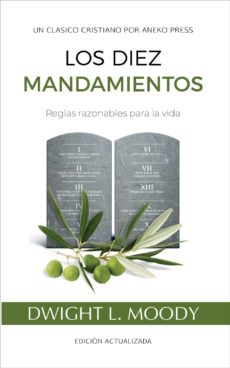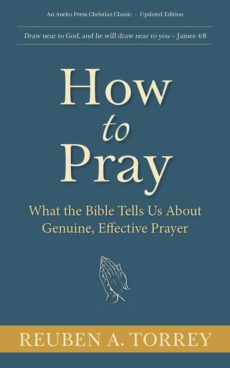How Shall I Go To God?
Original price was: $14.99.$4.99Current price is: $4.99.
He loves us not because we are rich in goodness, but because He is rich in mercy; not because we are worthy of His favor, but because He delights in lovingkindness.
Share this product
If you ask, He will give you living water! That is all you have to do – ask. How real, how true, how free – yet how simple! This is grace. He loves us not because we are rich in goodness, but because He is rich in mercy; not because we are worthy of His favor, but because He delights in lovingkindness. His welcome to us comes from His own graciousness, not from our lovableness. Christ invites the weary. It is this weariness that fits you for Him and Him for you.
Pardon, peace, and life – all of them are gifts, divine gifts, brought down from heaven by the Son of God, presented personally to each needy sinner by the God and Father of our Lord Jesus Christ. They are not to be bought but received as men receive the sunshine – complete and sure and free. They are not to be earned or deserved by exertions, sufferings, prayers, or tears, but should be accepted at once as the purchase of the labors and sufferings of the great Substitute. They are not to be waited for but taken on the spot without hesitation or distrust, as men take the loving gift of a generous friend. They are not to be claimed on the ground of fitness or goodness, but of need, unworthiness, poverty, and emptiness.
Lift up your eyes and look to Jesus Christ, the author and finisher of our faith!
About the Author
In 1808, Horatius Bonar was born into a family of several generations of ministers of the gospel. He graduated from the University of Edinburgh and was ordained in 1838. As a young pastor at North Parish, Kelso, he preached in villages and farmhouses, proving himself to be a comforter and guide. In 1843, he joined 450 other pastors to form the Free Church of Scotland after the “Disruption.” Horatius Bonar wrote numerous books, tracts, periodicals, and more than 600 hymns. He believed that people needed truth, not opinions; God, not theology; and Christ, not religion. From his first sermon to his last, he ended with “In such an hour as ye think not, the Son of Man cometh.”
YouTube Audiobook






1 review for How Shall I Go To God?
What a beautiful presentation of the gospel message! Although I’ve heard of him, I’ve never read anything by Horatius Bonar before, but I would like to read more now.
Bonar begins the book with this sentence, “It is with our sins that we go to God, for we have nothing else to go with that we can call our own.” Those of us who follow Christ know that He takes our sins and “cleanses from all unrighteousness.” (1 John 1:9) However, this first sentence struck me all over again with gratitude for this incredible thing that God chose to do for His rebellious, betraying creation – humankind. To take our worst and exchange it for His best demonstrates what a compassionate and gracious Father He is! (Psalm 103:8)
Chapter 2 proceeds with presenting our Hope. “But God quenches no hope without presenting a brighter one, one that will last forever. For He does not mock the creature that He has made nor wither up His fairest flower without a reason, and that reason is filled both with wisdom and love. He cares for us. He desires to make us happy. He loves us too much to cheat us with dreams.”
The source of our hope, the extraordinary Substitute, is introduced in chapter 3. “It is the sin-bearing completeness of the Son of God as the Substitute that the sinner rests on. It is on this that we take our stand in our dealings with God. We need a sin bearer, and God has given us One who is altogether perfect and divine.”
This lovely presentation of the gospel message continues through the warning that, “God is each day calling aloud to us and pointing us from the rocks to the haven of safety in Jesus Christ our Lord – to one haven that no storm can reach.” Because of our own pride and self-righteousness, we often respond saying we can’t. “He won’t do that which God wishes him to do; he substitutes something else of his own, some process of preparation for acceptance.” We forget to “Remember there is a long eternity” awaiting us. “Our eternal future is no dream nor fable. It will be as real as our past has been, even more so. Unbelief may try to persuade us that is a shadow or a fancy. But it is not.” Where will you spend eternity? “Do you hate the question? Does it disturb your rest and ruin your pleasures? Does it worry your conscience and cast a shadow over life? Yet, whether you hate it or love it, you must one day be brought face to face with it. You will one day ask it and answer it.” “The world passes away. But man is immortal. Eternity lies before each son of Adam as the duration of his lifetime. In light or in darkness forever! In joy or in sorrow forever!” “If eternity is a reality, then I need to prepare for it, for endless terror or endless joy is not a trivial matter.” “If sin is a fact, then I must not trifle with it. And if God hates it utterly, then I must hate it too, and I must get rid of it. And I must get free of it in God’s way, for no other way of deliverance will be successful.”
“God has fully made known that which makes up the good news for sinners. … In love He gave His Son as the bearer of our sins, as the Lamb of God, which taketh away the sin of the world (John 1:29). In love He has written down for us the whole story of the life and death of this divine sin bearer. … The Son of God there became man … There He who knew no sin came under the burden of our sins. For sin is so evil, God is so just, and the law is so holy that either we must bear our own sins or another must bear them for us; they cannot pass unpunished. There must be a substitute if there is to be salvation. … He went up to the cross as the sin bearer; He went down to the grave as the same. He rose again the third day as one who had done the whole work and who had been accepted by the Father as such. All the perfection of Christ’s person and work is now presented to the sinner so that he may receive it and be saved.”